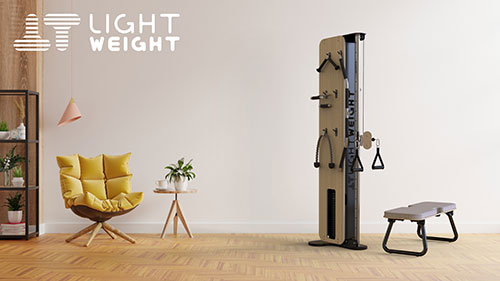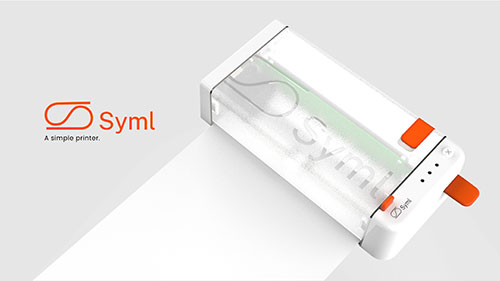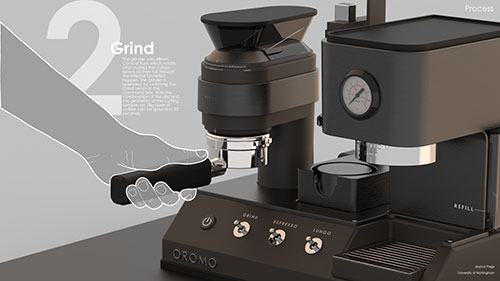Monday, 27 June 2022
An array of innovative new product concepts designed to make it easier to work, cook and exercise at home will be on display in a student showcase later this week.
The products are just some of the inventions created by students from the University of Nottingham’s Product Design and Manufacturing courses and include a home workout kit, a miniature printer and a portable extractor fan.
In total, more than 30 products will be on display as part of their end of year show, which goes live online on Wednesday 29 June.
Alec Machin, Assistant Professor and Programme Director for Product Design and Manufacturing, said that many of this year’s projects have been heavily influenced by the pandemic.
Undoubtedly the events of the last few years have had a big impact on the products our students are designing.
“We’ve seen a real focus on those that are linked to the fact we are at home more – whether that be working from home, exercising at home, or just generally going out less and using our kitchens more.”
Among these is the LightWeight, a home workout bench, designed by Sachin Ghelani, a student on the MEng Product Design and Manufacture course.
The bench allows users to lift weights, ranging from 5kg to 100kg, using a cable system. It features a variety of attachments including a lat-pulldown bar and a tricep pushdown bar, and is designed to blend in with home interiors, using natural colours and textures.
Sachin said: “My inspiration for the LightWeight came from my own hobbies which include health and fitness, and interior design. I wanted to create a piece of functional workout equipment that would blend seamlessly into people’s homes, especially now that they are spending more time in that space.”
 LightWeight – an interior-design inspired home workout kit
LightWeight – an interior-design inspired home workout kit
Patrick Richards, 21, a student on the BEng course, also took his inspiration from the increasing amounts of time people are spending at home.
He designed Syml, a miniature Bluetooth printer, which connects quickly and easily, takes up little space on your desk and can be easily moved around. It is designed for those who don’t need to print vast amounts, so don’t need a standard printer, but may need to print out the occasional document or package return label.
Patrick said: “Printers are probably the most hated piece of technology in people’s lives and have not seen significant improvement in decades, so for this project I aimed to drag the domestic printer into the 21st century.
“I did this by solving people’s problems with them; the fact they are too large, prone to breaking, expensive to refill, and on the whole overcomplicated and confusing to use.”
 Syml, a miniature Bluetooth printer
Syml, a miniature Bluetooth printer
All of the projects on display are final year projects from students on either the three-year Bachelor of Engineering course or four-year Masters course. Both courses include the option of a year in industry, with many students going on to gain jobs at the companies where they had their placement.
Alec said: “Our courses are quite unique compared to other universities in that we offer an engineering degree compared to an arts degree, and we sit within the Department of Mechanical, Materials and Manufacturing Engineering.
"We are all about designing for real people and having a constant focus on the end user, and because of the engineering element our students have a great understanding of manufacturing processes. They’re not just designing things that look nice but coming up with solutions that are actually feasible to make.”
The show is available to view online from Wednesday 29 June at https://www.nottingham.ac.uk/engineering/pdm-exhibition/pdm-exhibition.aspx
Student case studies:
Case study 1: LightWeight – an interior-design inspired home workout kit
Sachin Ghelani is a student on the MEng Product Design and Manufacture course.
His project was inspired by the increasing amounts of time people are spending at home since Covid, and the need for an alternative way of working out when you can’t, or don’t want to, attend a gym.
The LightWeight is a functional cable machine for home use, which allows users to lift weights ranging from 5kg to 100kg. It features a range of attachments including a lat-pulldown bar, a tricep pushdown bar, a double-D handle, two individual cable handles, a rope attachment and a set of carabiners. The pulley head can be adjusted to 21 different heights.
It is designed to blend in with home interiors, using natural colours and textures, and folds away into neat, unobtrusive packaged when not in use.
Sachin said: “I enjoy taking problems and finding creative and innovative solutions which are technically feasible.”
Case study 2: Cair – portable kitchen extractor and air purifier
Jake Woollard, 23, of Leicestershire, is a student on the MEng in Product Design and Manufacture.
His product Cair is a portable extraction unit – about the size of a large toaster – and is designed for people that are unable to change, modify or install their own kitchen extraction unit, so is particularly suitable for those in rented accommodation.
Cair monitors air quality in the kitchen and automatically works to purify the pollution released when cooking. The product has been designed to be easy to clean, with a removable upper body containing a two-stage filtration system.
An app has also been developed, allowing it to be operated remotely.
Jake carried out his industrial placement year at Dyson and has now secured a job there upon graduation.
He said: “Seeing someone’s face light up when trying out a piece of technology you’ve helped to develop is a fantastic feeling, and something I can’t imagine will get boring!”
Case study 3: Syml
Patrick Richards, 21, of Cardiff, is an third-year student on the BEng course.
His product Syml is a miniature Bluetooth printer. It is designed for people who don’t need to print large volumes of documents and aims to simplify the printing process.
By redesigning the way paper is fed through, how documents are printed, and how it connects to your computer, he has created a simple-to-use printer, less prone to breaking.
He said: “User behaviour has changed so much and the printer industry doesn’t seem to have kept up with it. Gone are the days of needing a huge printer that sits out on your sideboard the whole time.
“People want something that they can store in a cupboard and bring out occasionally, and that’s what I’ve aimed to do with this.”
The printer connects via a Bluetooth dongle and contains fewer components than larger printers, increasing the speed of printing and reducing the risk of it breaking down.
 OROMO – a compact bean-to-cup coffee machine
OROMO – a compact bean-to-cup coffee machine
Case study 4: OROMO – a compact bean-to-cup coffee machine
Jessica Page, 21, of Hertfordshire, is a student on the BEng in Product Design and Manufacture.
Her product allows you to become a barista in your own home, following all the steps needed to make the perfect cup of coffee.
Unlike other bean-to-cup machines on the market, Jessica’s product requires more interaction from the user. Rather than simply pressing a button and letting the machine do the rest, OROMO allows users to carry out the basic steps themselves, but takes away the scientific element, meaning you always get a perfect cup of coffee.
Jessica said: “It’s for people who enjoy making a cup of coffee but don’t have the scientific knowledge. You’re effectively the barista, but all the variables are taken out of the process.”
The name OROMO is derived from the name of the tribe known for the earliest use of coffee.
Notes to editors:
About the University of Nottingham
Ranked 24 in Europe and 15th in the UK by the QS World University Rankings: Europe 2024, the University of Nottingham is a founding member of Russell Group of research-intensive universities. Studying at the University of Nottingham is a life-changing experience, and we pride ourselves on unlocking the potential of our students. We have a pioneering spirit, expressed in the vision of our founder Sir Jesse Boot, which has seen us lead the way in establishing campuses in China and Malaysia - part of a globally connected network of education, research and industrial engagement.
Nottingham was crowned Sports University of the Year by The Times and Sunday Times Good University Guide 2024 – the third time it has been given the honour since 2018 – and by the Daily Mail University Guide 2024.
The university is among the best universities in the UK for the strength of our research, positioned seventh for research power in the UK according to REF 2021. The birthplace of discoveries such as MRI and ibuprofen, our innovations transform lives and tackle global problems such as sustainable food supplies, ending modern slavery, developing greener transport, and reducing reliance on fossil fuels.
The university is a major employer and industry partner - locally and globally - and our graduates are the third most targeted by the UK's top employers, according to The Graduate Market in 2024 report by High Fliers Research.
We lead the Universities for Nottingham initiative, in partnership with Nottingham Trent University, a pioneering collaboration between the city’s two world-class institutions to improve levels of prosperity, opportunity, sustainability, health and wellbeing for residents in the city and region we are proud to call home.
More news…